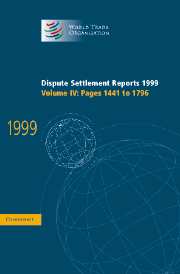India - Quantitative Restrictions on Imports of Agricultural, Textile and Industrial Products (WT/DS90) Report of the Appellate Body
Published online by Cambridge University Press: 22 December 2017
Summary
INTRODUCTION
India appeals from certain issues of law and legal interpretations developed in the Panel Report, India - Quantitative Restrictions on Imports of Agricultural, Textile and Industrial Products (the “Panel Report”). The Panel was established to consider a complaint by the United States relating to quantitative restrictions imposed by India on imports of agricultural, textile and industrial products.
India maintains quantitative restrictions on the importation of agricultural, textile and industrial products falling in 2,714 tariff lines. India invoked balance of- payments justification in accordance with Article XVIII:B of the GATT 1994, and notified these quantitative restrictions to the Committee on Balance-of- Payments Restrictions (the “BOP Committee”). On 30 June 1997, following consultations in the BOP Committee, India proposed eliminating its quantitative restrictions over a seven-year period. Some of the Members of the BOP Committee, including the United States, were of the view that India's balance-of payments restrictions could be phased out over a shorter period than that proposed by India. As a result, consensus on India's proposal could not be reached. The relevant factual aspects of this dispute are set out in greater detail in paragraphs 2.1-2.28 as well as in paragraphs 3.345-3.417 of the Panel Report.
On 15 July 1997, the United States requested consultations with India under the Understanding on Rules and Procedures Governing the Settlement of Disputes (the “DSU”) on the consistency of the latter's quantitative restrictions with its WTO obligations. Japan participated as a third party in these consultations. Subsequently, Australia, Canada, the European Communities, New Zealand and Switzerland also requested consultations on claims similar to those of the United States. India reached mutually agreed solutions with all concerned parties except the United States.
The United States requested the establishment of a panel to examine the consistency of India's balance-of-payments restrictions with its obligations under Article XI and Article XVIII:11 of the GATT 1994, Article 4.2 of the Agreement on Agriculture and the Agreement on Import Licensing Procedures.
In its Report, circulated on 6 April 1999, the Panel concluded that:
(i) the measures at issue applied by India violate Articles XI:1 and XVIII:11 of GATT 1994 and are not justified by Article XVIII:B;
(ii) the measures at issue, to the extent they apply to products subject to the Agreement on Agriculture, violate Article 4.2 of the Agreement on Agriculture; and
- Type
- Chapter
- Information
- Dispute Settlement Reports 1999 , pp. 1763 - 1796Publisher: Cambridge University PressPrint publication year: 2002
- 4
- Cited by



